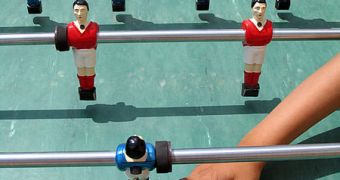UN officials highlight that climate change is correlated with extreme weather, heat waves and severe drought. All these unfriendly conditions could make us forget about football, one of the most popular sports all across the Globe.
While most of the people tend to disregard the serious consequences triggered by this phenomenon, already reflected in several regions, experts warn that its influence can leave football fans without their hobby, reports Txchnologist.
The authors of the Intergovernmental Panel on Climate Change have announced that we are going to deal with more hot days and much more frequent heat waves.
These changes can affect football in a considerable manner. First of all, increased temperatures will dry up most of the football fields. This process is currently noticeable in Texas, where authorities already have to deal with this problem.
Of course, grass from football fields could be replaced with synthetic alternatives, but this option is much more expensive and less reliable when it comes to stored heat, as it can hit 100 degrees Fahrenheit (37.7 degrees Celsius) in no time.
A powerful drought has left several fields dry in small towns, ruining the supporters' usual Friday night fun. Scientists warn that this is not an isolated case, as climate change will continue disrupting sports activities in four states hosting five college football champions: Texas, Florida, Alabama, and Louisiana.
Meteorologists say that, by the end of the century, these four states will experience extreme temperatures of over 90 degrees Fahrenheit (32.2 degrees Celsius), for 180 days every year. In these particular conditions, football could no longer be played or enjoyed.
Many football players will most likely think about finding a more risk-free job, as hyperthermia will become a common occurrence that will put their lives in great danger. A recent report reveals that, between 1980 and 2009, 58 misfortunate players died of hyperthermia on the field, even in cases when they had to face lower levels of heat and humidity.
Moreover, natural phenomenon like hurricanes and tornadoes can interfere with the normal course of a game. For example, in 2005, New Orleans Saints were left without a rooftop after angry Hurricane Katrina made its presence known to the crowd of supporters gathered to cheer for their favorite team.
At this point in time, it is certain that climate change is powerful enough to affect football players and stadiums. Unless experts come up with efficient preservation measures, foosball might soon become our one and only source of entertainment.

 14 DAY TRIAL //
14 DAY TRIAL //